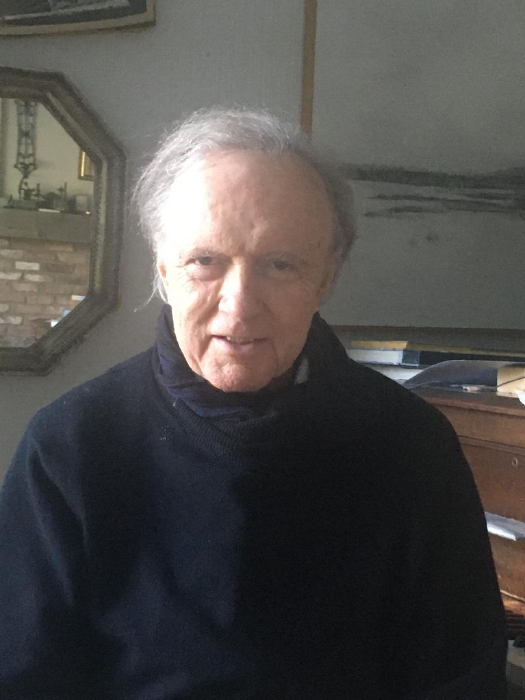
Eugene Mahon
Good morning, everyone. I do hope it’s a good one for most of you. How I wish we could feel relieved that the pandemic is over, but of course we can’t – not yet. And we have a new one dawning. Hope is not a cure, but hope can help – as can poetry, which eases the soul.
Our poet today, Eugene Mahon, is someone known to many of you in the psychiatric profession, but for those who aren’t, here are some facts about his interesting background.
Eugene Mahon, M.D., is a Training and Supervising Psychoanalyst on the faculty of Columbia Psychoanalytic Center for Training and Research. A member of the Center for Advanced Psychoanalytic Studies, Princeton, N.J., he practices adult and child psychoanalysis in New York City.
He has published four books on psychoanalysis: A Psychoanalytic Odyssey (Karnac Books, 2014), Rensal the Rabbit (Karnac Books, 2014), Boneshop of the Heart (IPBooks, 2016), and Such Stuff as Dreams: A Psychoanalytic Inquiry with an Introduction by Theodore Jacobs (IPBooks, 2022), as well as more than fifty articles on a wide variety of analytic and literary subjects. He has also published a number of plays. His poems have appeared in many journals and anthologies. One of his poems, “Steeds of Darkness” was set to music by the American composer Miriam Gideon.
It’s my pleasure to introduce the following poems by Eugene Mahon:
My Trade
Learning to Ride a Bike
De Senectute
–Irene Willis
Poetry Editor
My Trade
When I’m asked what I do for a living I have to pause.
The question catches me off guard and I have to think.
I am a psychoanalyst.
I listen.
Can that be the all of it?
I hear.
What I hear is also at the core of it.
“You like to make things out of what I say” a child once said to his child analyst. I think he was right. I did make things out of what he said. Once he spoke about an octopus in his dream. I told him I spoke octopus and that made him laugh. But he trusted me after that.
Speaking octopus is my craft, my trade. As a child “do you want to make something out of it?”was a threat, as one child thrust his jaw into another’s face and insisted that whatever he had said could never be challenged.
Best to back down then or get your nose bloodied. Backing down is fear’s first move before it lashes out.
“Do you have anything for tears” a woman in a locked ward of a psychiatric asylum asked me.
She wanted me to prescribe something.
I was a young doctor, wet behind the ears. Her question made me weep.
“What kind of a doctor are you” she asked.
I had no answer.
I once recited a poem in a demented man’s ear.
He accompanied me, memory on loan for an instant. I never took it back. Two thousand years ago Artemidorus was a dream collector, coin of the realm of sleep. Dreams remind us who we are when being awake is a nightmare.
I once saw a man playing cards with an imaginary deck. I was ashamed of looking on at something I was not supposed to see. When I saw some cards from his game fallen at my feet I leaned down to pick them up; fear wouldn’t let me.
Was I part of a game myself?
Aren’t we all?
There are worse trades I guess than putting dreams to work and guiding them out of the dark. They add a kind of excess, a kind of awkward lighting to the day.
Learning to Ride a Bike
How many times he fell
as he struggled with the bike
as if he was a matador
trying to outfox a bull.
It was a strange machine
with a mind of its own
hellbent on gravity,
clinging to it while he defied it.
He would get the hang of it
like a kite’s grip on the wind
only to lose it
and come crashing down again.
He blamed the bike,
insulting it, kicking it
and then making up with it
and trying again.
With one leg on the pedal
he’d get momentum going
then throw the other leg
over the saddle to the far side straightening out the wobble
like a skater.
And then the moment came
when his weight and the bike’s
came to an agreement
as if they were one wheel
caught in the draft of momentum,
never to let go again of the thrill
of walking the tightrope of gravity
like a circus master.
He kissed his treacherous bicycle
and rode it rattling on the cobbles
as he threw open
all the doors of the wind.
De Senectute
Earth’s the right place for love. I don’t know where it’s likely to go better. Robert Frost.
To be old is to be part of the earth
more than ever,
feet more grounded, face pressed into the wind more
as love deepens.
We are salt,
and more than salt.
We feel it when evolution races through our blood streams
as if history were a string of heart beats
and flesh one commodity shared by all.
In truth we are all separate envelopes of life:
our loneliness came from our mothers as language and memory put distance between us.
And no turning back no matter what the dream says.
Illusion cannot feed us as principled Freud maintained. Reality must open its mouth.
But when the sky dips its face in the lake and all the color in the world rinses itself in evening half light, love holds the only truth we know. To be part of the earth, however briefly, is to know more and to have felt more than the heartless sun.
